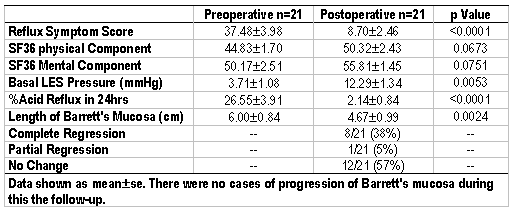# 105213 Abstract ID: 105213 Does Laparoscopic Nissen Fundoplication Cause Regression of Barrett's Esophagus?
Fahad Bamehriz, Sanjeev Dutta, Catherine Gill Pottruff, Mehran Anvari, Hamilton, Canada
Recent studies have suggested that open anti-reflux surgery may produce regression of Barrett's mucosa. We reviewed 21 patients (13M: 8F, mean age of 46.7+-3.18 years) with documented Gastroesophageal Reflux Disease (GERD) and Barrett's esophagus who underwent laparoscopic Nissen fundoplication (LNF) between 1993 and 2000. Endoscopically, the extent of Barrett's esophagus (intestinal metaplasia) was defined as the distance from the gastro-esophageal junction to highest point of the squamocolumnar junction. All patients had undergone pre- and yearly postoperative upper GI endoscopy with 4 quadrant biopsies every 2 cm. All patients also underwent pre- and 6 months postoperative 24-hr pH study, esophageal manometry, SF36, and GERD symptom score. Results: The mean duration of GERD symptoms was 8.4 years prior to surgery. All patients were on long term Proton Pump Inhibitor therapy. The mean follow-up after surgery was 39 months. Data shown as mean+-se. Conclusion: Laparoscopic Nissen Fundoplication in patients with Barrett's esophagus results in significant control of GERD symptoms and improvement in quality of life. LNF can prevent progression of Barrett's esophagus and in a significant proportion of patients leads to complete or partial regression of Barrett's mucosa.

|
 500 Cummings Center
500 Cummings Center +1 978-927-8330
+1 978-927-8330
 +1 978-524-0461
+1 978-524-0461